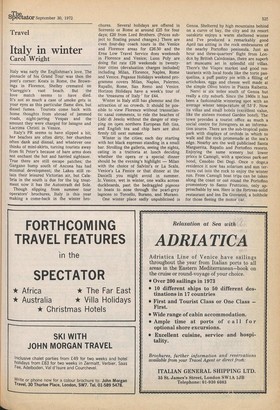Italy in winter
Carol Wright
Italy was early the Englishman's love. The pinnacle of his Grand Tour was then the poet's corner: Keats in Rome, the Brownings in Florence, Shelley cremated on Viareggio's vast beach. But the love match seems to have died. It's not so much a case of smoke gets in your eyes as this particular flame dies, but diesel fumes. Tourists come back with home thoughts from abroad of jammed roads, night-jarring Vespas and the amount they were charged for lasagne and Lacrima Christi in Venice.
Italy's PR seems to have slipped a bit; her beaches are often dirty, her churches often dank and dismal, and whatever one thinks of mini-skirts, turning tourists away from St Peter's because of bare arms does not enchant the hot and harried sightseer. True there are still escape patches; the Gargano bump south of Ancona has had minimal development; the Lakes still retain their leisured Victorian air, but Calabria in the south is due for the big treatment now it has the Autostradt del Sole.
Though slipping from summer tour Operators' brochures, Italy is this year making a come-back in t'he winter bro
chures. Several holidays are offered in Sorrento or Rome at around £25 for four days; £20 from Lord Brothers. (Prices subject to floating pound changes.) There are even four-day coach tours in the Venice and Florence areas for £26.50 and the Erna Low Travel Service does weekends in Florence and Venice; Lunn Poly are doing flat rate £28 weekends in twentyfour cities (devaluation charges included) including Milan, Florence, Naples, Rome and Venice. Pegasus Holidays weekend programme covers Milan, Naples, Palermo, Rapallo, Rome, San Remo and Venice. Horizon Holidays have a week's tour of the 'treasures of Italy ' for £44.
Winter in Italy still has glamour and the attraction of no crowds. It should be possible to view Florence without transatlantic nasal comments, to ride the beaches of Lido di Jesolo without the danger of stepping on open northern European fish tins, and English tea and chip bars are shut firmly till next summer.
Winter in the cities; each day starting with hot black espresso standing in a small bar. Strolling the galleria, seeing the sights, eating in a trattoria at lunch deciding whether the opera or a special dinner should be the evening's highlight — Milan with the choice of Salvini's or La Scala, Venice's La Fenice or that dinner at the Danielli you might avoid in summer. In Venice, wet in winter, one walks across duckboards, past the bedraggled pigeons to boats to nose through the pearl-grey lagoons to Torcello, Burano, and Murano.
One winter place sadly unpublicised is Genoa. Sheltered by high mountains behind on a curve of bay, the city and its resort outskirts enjoys a warm sheltered winter and I've produced a remarkably good April tan sitting in the rock embrasures of the nearby Portofino peninsula. Just an hour and three-quarters' flight from Londen by British Caledonian, there are superb art museums set in splendid old villas. There's the Viapre market and good restaurants with local foods like the torte pasquelina, a puff pastry pie with a filling of artichokes, eggs and cheese well made at the simple Olivo bistro in Piazza Raibetta.
Nervi is six miles south of Genoa but really a city suburb. Since the 1860s it has been a fashionable wintering spot with an average winter temperature of 53F. Now its villas and small hotels (excellent value, like the sixteen roomed Garden hotel). The town provides a tourist office as much a social centre for foreigners as an information source. There are the sub-tropical palm park with displays of orchids in which to walk and the rock promenade at the sea's edge. Nearby are the well publicised Santa Marguerita, Rapallo and Portofino resorts. Enjoying the same scenery but lower prices is Camogli, with a specious park-set hotel, Cenobio Dei Dogi. Once o doge,s residence it now has solarium and sun terraces cut into the rock to enjoy the winter sun. From Camogli boat trips can be taken along the coast or out round the Portofino promontory to Santo Fruttuoso, only approachable by sea. Here is the fortress-solid restaurant and inn Da Giovanni, a bolthole for those fleeing the motor car.










































 Previous page
Previous page